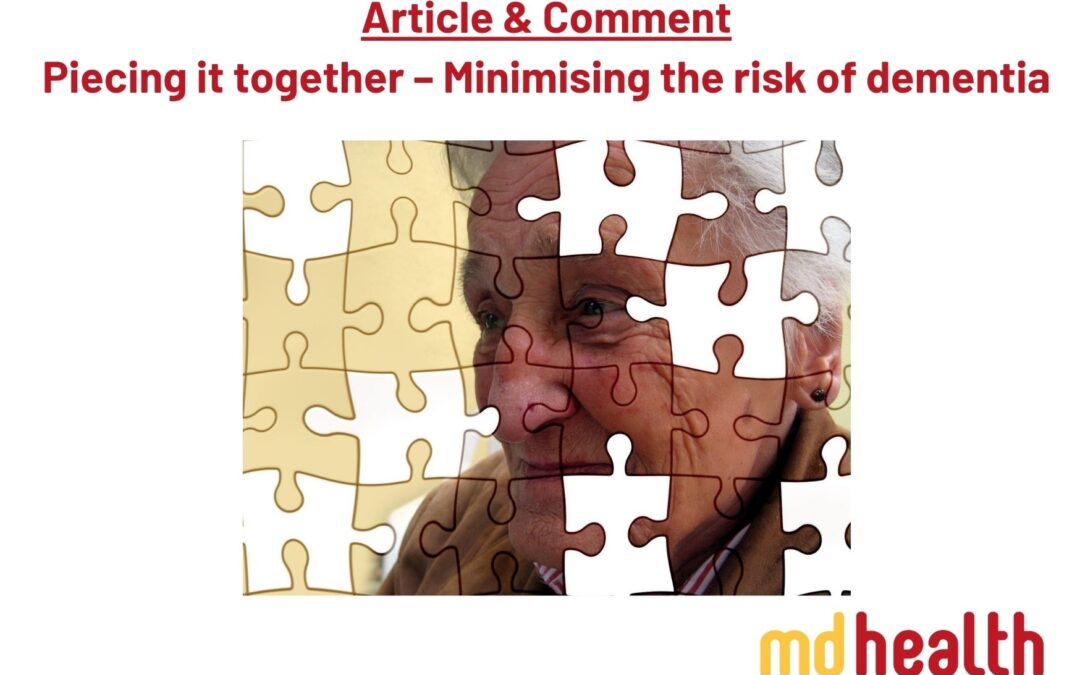Piecing it together – Minimising The Risk of Dementia
With more research, we are getting to know more about the progression of dementia and specifically Alzheimer’s disease, and what happens at the brain level. However, the initial trigger for the disease is still an unknown, but there are consistent things you can still do to minimise your risks of dementia in the long term:
What we know about the disease:
- Beta-Amyloid plaques (a sticky, protective protein in the brain) are a hallmark of the disease, but it is still unclear whether this is the cause or a protective mechanism that results in the disease.
- The accumulation of the protein Tau, which can clump together in the axons of the nerve cells, interfering with their ability to communicate. The amount of Tau build up correlates with the amount of dementia, even more so than beta-amyloid.
- The Apolipoprotein gene – e2 variant reduces the risk and the e4 variant increases it, which promotes the formation of beta-amyloid and enhances neuro inflammation, when affects the blood-brain barrier.
- Severe gum disease (The bacteria that causes it, Porphyromonas gingivalis) will increase the risk of dementia by 70%. It can migrate from the mouth into the brain. Giving mice a drug that blocks the toxic enzymes that it produces reduces inflammation in the brain and one type of beta-amyloid.
- The herpes virus may also trigger the production of amyloid. The initial response is protective (as amyloid is an antimicrobial protein), causing an inflammatory response that helps to neutralise and clear the infection, but when the inflammation persists it activates the microglia and astroctyes (protective cells in the brain), which become neuron-damaging instead of protective, increasing inflammation.
So what can you do to protect yourself:
- Diets high in saturated fat and sugar – can lead to higher inflammation and immune dysfunction in the brain. A great rule of thumb is the greater the variety of foods that you eat, the more chances you will have the range of nutrients you need for life, however, in regards to brain function, a healthy ratio of Omega-3 to Omega-6 fatty acids in your diet affects brain function. Omega-6 competes with Omega-3 in your body’s Eicosanoids system, which is part of your body’s immune system. A higher ratio of Omega-6 increases blood clotting factors and encourages inflammation, whilst your Omega-3 does the opposite. The ideal ratio of Omega-6 to Omega-3 is 1:1, however, most western diets are 20:1, due to our use of vegetable oils. However, if you can get the ratio to 4:1, by eating more oily fish, flax seed oil and having more plant based food in your diet.
- Regular exercise and an active lifestyle – Regular exercise has consistently been shown to be the strongest factor in slowing down and reversing the aging process in the brain. There are 2 major reasons. Firstly, exercise reduces the inflammatory process, which inhibits the growth on new nerve cells and secondly, exercises increases the release of a critical nerve growth protein called brain-derived neurotrophic factor (BDNF). To raise your BDNF, you need to exercise at least 30 minutes on most days of the week at a vigorous (feels puffed during your workout) level. Unfortunately, just taking a walk is not enough, so challenging yourself in your workout to be somewhat puffed is important. In addition, a sedentary lifestyle negates these benefits of exercise, so avoiding sitting and being active throughout the day is also a key.
- Strength training in particular – Is one of the things that you can do to improve long term cognitive function and memory. People who are stronger in middle age have more grey matter in their brain and memory a decade later. The explanation may be because weight-bearing training releases Osteocalcin from the bones. This improves the size and connectivity of the hippocampus, which has a major role in memory and learning.
- Poor sleep function – has been repeatedly been linked to dementia. As you sleep, potentially harmful proteins are flushed away by the brains waste removal mechanism, the glymphatic system. Reduced sleep has been shown to increased beta-amyloid and tau accumulation and inflammation in the brain. At least 7 hours of sleep and maintaining good sleep hygiene habits reduces this risk.
- Pursuing cognitively demanding activities – Learning a brand new skill, especially a new language or dancing stimulate the growth of new brain cells, prevent nerve death and improve neuroplasticity (your nerve’s ability to adapt). Although brain-teasers and puzzles engage your cognitive skills, there are not enough to stimulate nerval growth, so learning a brand new, uncomfortable new skill that requires repeated practice and concentration makes the biggest difference in brain health.
- Keeping in touch with others – Loneliness and isolation increase the risk of many factors that increase inflammation, including high blood pressure, diabetes, obesity and heart disease, which inhibit neural growth. Having contact with other people, even through passing interactions such as with shopkeepers, neighbours and other people in society improves memory formation, recall and is protective against neurodegenerative diseases.
Do you have any questions?
- Call us on (03) 9857 0644 or (07) 3505 1494 (Paddington)
- Email us at admin@mdhealth.com.au
- Check out our other blog posts here
Our clinical staff would be happy to have chat if you have any questions.



